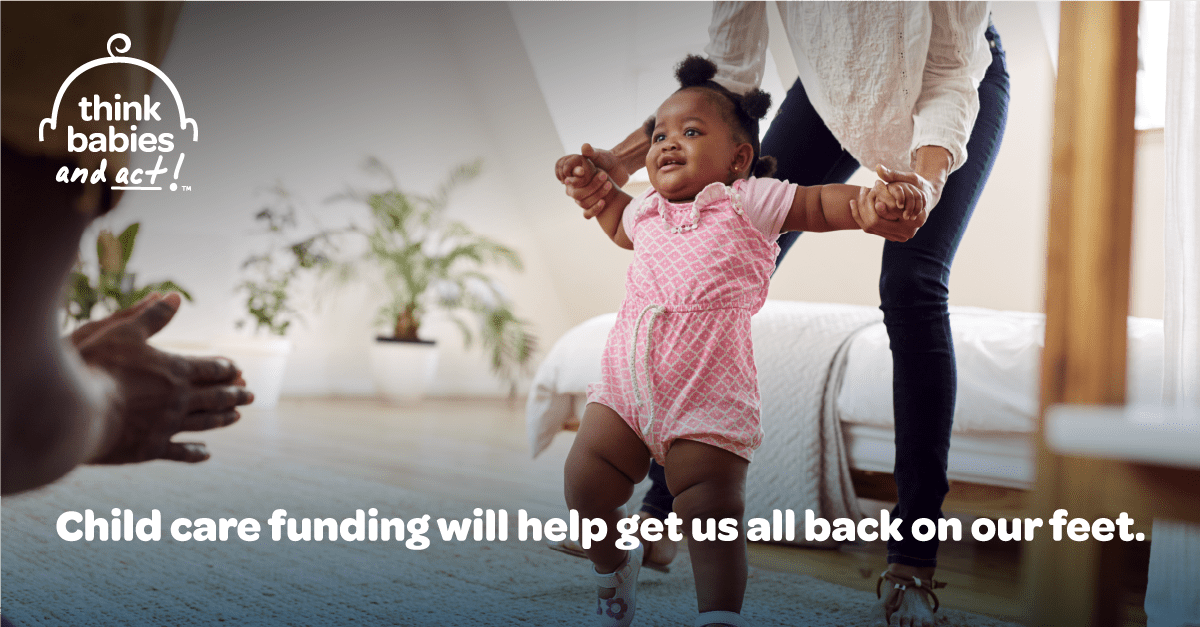Despite the key role child care providers are playing in support of other essential industries during the COVID-19 crisis, the child care system as a whole is at risk of collapse due to the economic impact. Providers and families of infants and toddlers speak to the issues.
Despite the key role child care providers are playing in support of other essential industries during the COVID-19 crisis, the child care system as a whole is at risk of collapse due to the economic impact. Many providers are closing their programs, unable to sustain operations with diminishing enrollment. Others are staying open despite the physical risk, to support the needs of working families in their community. Providers and families of infants and toddlers speak to the issues.
“Why is early childhood educators’ work viewed so minimal compared to others? During this crisis, we’re expected to be front-liners – now others see our value in society. How important we are!” – Anita, child care provider from Greensboro, NC
Physical Health and Safety
“We know that we are putting both our team and families in harm’s way by being open, but we have not closed. The few families we are serving are essential workers, or families who are trying to work from home whose employers do not understand that working from home with a small child is hard! They bring us their children because they worry about surviving through their own businesses cuts.” – Renee, child care provider from Appleton, WI
“As a small private child care provider serving few essential workers, we made the difficult decision to close for the protection and safety of our children, families, and staff. Our future is uncertain, and we need fiscal relief for our employees and our ability to sustain this circumstance.” – Michele, child care provider from Tracy, CA
“I am a toddler teacher, and I cannot afford health insurance. My son died [in January, before the pandemic] because I was too scared of the emergency room bill, so I took him to a careless clinic where he received very little care. I walked out thinking he only had a little bug, he died less than three days later. Are we going to wait for the next pandemic to move to a system of nationalized health care?” – Leticia, child care provider from Englewood, CO
“If the children I serve are still hungry after the recommended portion for their age, there is no second serving now. Stores have limited supplies and limits on amounts purchased in our area, and they are raising prices. My own children will not be getting a second serving of food or more milk, because child care children also need these items. I had to witness my daughter cry this week, because I had to tell her she can’t have more food or milk.” -Justine, child care provider from Los Angeles, CA
“I am a small group home child care provider with 5 children in my care full time. I depend on the full time care I give to support my family. I have lost families due to the loss of jobs and that impacts how I can support my own family during this time. I have fears every day of how to keep my family safe from the outside virus coming into my home, but I need to continue so that I can still pay my bills and feed my own family.” – Angela, child care provider from Glendale, AZ
Dwindling Enrollment and Income
“We are considered essential work force but we have no benefits. I am a family child care provider. Parents have stopped bringing their children and don’t want to pay. We cannot fill the spots. It is very difficult to care for my own children without steady income and not knowing what will happen tomorrow.” – Elizabeth, child care provider from Arlington, VA
“We need financial support. We have lost income from families that have disenrolled. With the reduction of income it has meant reducing team hours and losing some teachers. We fear those taking unemployment will find a supplementary income and will not come back to the child care after this is done because of the low wages.” – Renee, child care provider from Appleton, WI
“We are facing having to close our licensed family child care that has been serving our community for the past 13 years. My enrollment has decreased from 21 children enrolled total, 14 each day, to serving 4 children each day. We need emergency help to pay employees and make up for lost wages.” – Amy, child care provider from Aptos, CA
“Many families that qualify for daycare assistance are now out of work and staying home. Subsidies are no longer being paid to centers for the absent children. This a huge loss of income for child care centers.” – Julie, child care provider from Livonia, NY
“I’m a childcare/preschool/child development center. I have gone from 81 kids a day to 2. I can’t stay open with 2. We are considered essential but how can I stay open without the help needed. I love my kids, staff and families but to ask me to go under because all of a sudden I’m essential? Really?” – Teri, child care provider from Eagle River, WI
“We are a nonprofit center mainly private pay. We need a way to maintain payroll of staff so that they can be ready to return when we are allowed to reopen. We need help paying our rent and health insurance costs. We want staff to maintain their health benefts now. We will also need help understanding how to open safely and how to adjust to new regulations, how to afford related training, and what to do if our families can’t afford to return. We need at least 2 weeks of fiscal support to get back to work too.” – Traci, child care provider from Philadelphia, PA
“Family child care (FCC) programs need grants to keep their business operating or allow for those that closed to reopen when its safe. SBA loans are out of funds. Self employed can apply for unemployment now, but I have been told that FCC providers may not qualify. Why? Why would FCC be treated differently? I will apply for unemployment but if denied, I may be left with no choice but to close my childcare program and seek employment elsewhere.“ – Tawnya, child care provider from Eaton, OH
Limited Essential Supplies’
“As a small business owner, I am worried I will need to close due to a shortage of essential supplies such as cleaning /disinfect materials and food. I will not qualify for unemployment benefits, no grants are available, and this drastically effects my family. I understand they offered us a loan, but a loan is money borrowed. How will I pay it back without income?” – Justine, child care provider from Los Angeles, CA
“Supplies are very limited and I am getting close to running out of daily essentials for cleaning and keeping my home safe and sanitized. I absolutely know that hospitals need the supplies,but I also feel that people working with small children need to have access to a part of the supply demand. like toilet paper, paper towels, lysol spray and wipes, sanitizer and more.” – Angela, child care provider from Glendale, AZ
Child Care, from the Family Perspective
“Oregon is now only working on child care for those on the frontlines. This is good and bad all at the same time. With so many facilities closed I worry about how many will be able to reopen once things stabilize and how expensive they will become so they can get back to a normal state.” – Tess, parent from Oregon City, OR
“Due to the pandemic, our daughter’s child care will be closed indefinitely. Since we are under contract, we will still have to pay child care fees on weekly basis. Because of our nation’s lack of paid leave and affordable child care, my husband and I had to make a decision. My husband will stay home with Ava which means cutting our income to one. And with one income we still have to pay the same amount of monthly expenses including child care fees.” – Shiela, parent from Bridgeport, CT
“I want Congress and policymakers to know that child care providers have been forgotten as heroes and essential workers. I see support for front line medical staff, and grocery employees, mail carriers and teachers (rightfully so!). But who is thanking the people who open their programs to the children of these people? Who is acknowledging the risk these men and women put themselves and their families in direct contact with by accepting these children, every day? And who is talking about how LITTLE these men and women are compensated for as they continue to teach and address the social-emotional needs of these children? I can afford to pay my child care provider while not attending, but only just. And I know that she is not getting paid what she deserves. I would love for Congress and policymakers to know that child care providers are an abused resource to the communities they serve, and I would love to see them get the spotlight they deserve as they step up (as they’ve ALWAYS done) in this time of crisis.” -– Chelsea, parent from Rochester, NY




